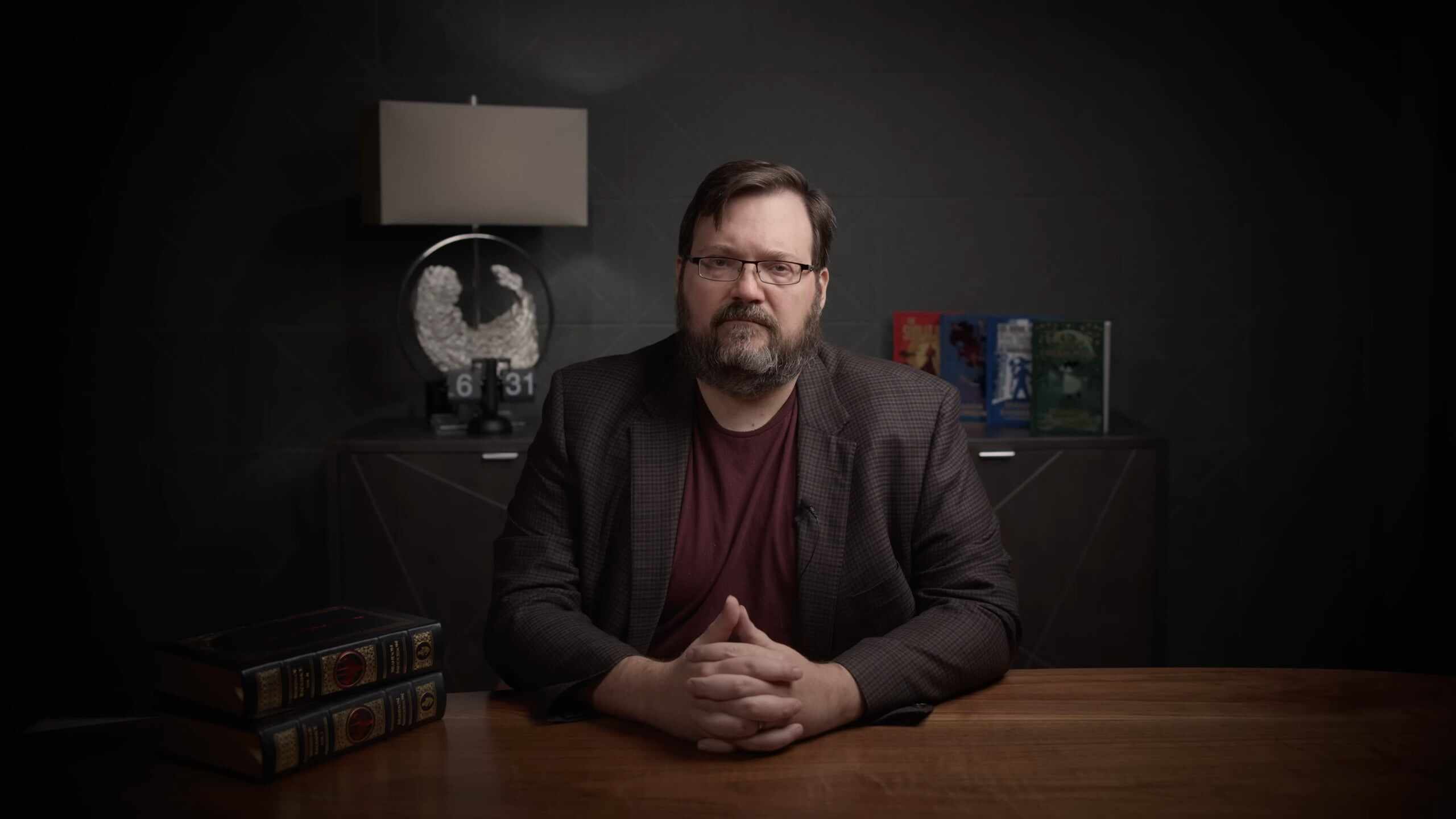Why is This My First Post?

Before diving into the Brandon Sanderson book controversy surrounding Wind and Truth, let me set the stage for why this topic matters to me.
I feel as though my journey as an independent author is starting to take shape. I started my publishing company, I’m right on the heels of releasing the second book in The Records of Eleshar, Forged in the Chasms of Darkness, and I’ve finally created a solid website.
So, why would I start my blog with a post that—on the surface—seems so negative?
Well, Brandon Sanderson is the 800-pound gorilla in the fantasy world, and his latest release of Wind and Truth did not come without controversy. So, I couldn’t think of a better topic to kick off my blog that this.
Also, I once counted myself as a member of the legions of his die hard fans. I’d read The Way of Kings back in 2011, then dove head first into everything he wrote. I funded the Kickstarter, and still have the four secret projects on my shelf. And yes, I’m still waiting for the fifth secret project that was part of his last Kickstarter.
So, I find myself qualified to have an opinion on this matter. Then again, who’s ever needed justification to have an opinion?
How I Became a Sanderson Fan
The Beginning
Michael Crichton’s Jurassic Park introduced me to the magic of books when my Dad read it to me as we waited in the dark parking lot of the local Zip’s Drive-In. We spent several nights a week there, waiting to pick up my Mom who was the closing manager at the time. The movie was about to come out and he thought it would be fun to read the book first, especially since we had the time to spare.
It would be a few years before the reading bug hit me, but some of my fondest memories were sitting in that old tank, listening to a story about dinosaurs and imagining Raptors coming out of the tall grass as it swayed at the edge of the parking lot. Just a few years later is when reading really took hold of me when I discovered the joy of lounging in my Dad’s recliner reading a book while the snow fell outside.
The Wilderness
Then life took hold of me—as it does—and as I built a family and a career, I found less time to read.

Then came 2011, when a friend of mine recommended The Way of Kings. I’d also dabbled as a writer for many years, but my writing was weak and friends and family showed no interest in my stories, so books had been slipping out of my consciousness.
Enter Brandon Sanderson
That book brought the world of fantasy crashing back into my world. Where the simmering worldbuilding of Tolkien, and the meandering plots of Robert Jordan failed to grab me, the dynamic magic of Roshar, and the incredible character of Kaladin had me turning those thousand pages like they were two hundred.
Back then, there was no debate about Sanderson’s writing changes or any Brandon Sanderson book controversy—just the unmitigated joy of great characters and a new world to explore.
The ending of The Way of Kings punched me in the face and had me asking for more. I didn’t care about Sanderson’s prose, or even some of the simplicity of his storytelling, I was in it for the characters, and the journey they were on.
So I dove into Mistborn, and I found more of that same thing! Then Elantris, and once again I found a book I couldn’t put down.
Then Warbreaker, The Rithmatist, Infinity Blade, Legion. I loved them all, and he wrote them faster than I could consume.
I was hooked.
Then came Words of Radiance. I devoured that twelve-hundred page book in two days, and it confirmed what I had been hoping all along: That for me, Brandon Sanderson was the prolific writer that couldn’t miss.
Is everything that he writes perfect? No. No one’s writing is perfect. But did I get that sweet, sweet dopamine rush? Absolutely!
So that, dear reader, is how I became a fan of Brandon Sanderson.
“I can safely say that the books that I’ve written would never exist if not for Brandon Sanderson, and I wouldn’t be the writer I am today without him…”
What I Personally Owe Brandon
Reading drove me to writing again. The more Sanderson I read, the more my own mind started crafting its own worlds and stories.
Then I discovered Writing Excuses. A writing advice podcast that Sanderson participated in. I binged every episode I could get my hands on as fast as I could find them. Then I listened to them again.
Suddenly, Sanderson wasn’t just an author I admired, whose work I couldn’t get enough of. He was a mentor of sorts, helping me to learn the craft of writing.
Just as I was getting to the end of podcast episodes, I found Brandon’s BYU lectures, and my learning increased.
While it’s true that he wasn’t my only source of instruction in writing, he was the catalyst that drove me. I can safely say that the books that I’ve written would never exist if not for Brandon Sanderson, and I wouldn’t be the writer I am today without him either.
But I’m not special. Thanks to Sanderson’s investment into the writing community, I’m sure there are hundreds, perhaps thousands of authors out there with stories just like mine.
So What Happened?
The Differences started in Oathbringer

Don’t get me wrong, it’s not a bad book. But I had come to see The Stormlight Archive as a place where I watched Kaladin struggle, lead, and save the day in the most spectacular of ways. It was where I suffered through Shallan’s low stakes plotlines that Sanderson fought to try and make more important than they were. And finally where I watched Dalinar be the steady rock that everyone could lean on, who united everyone and made them better than they could have been on their own.
Oathbringer was the first book that made me wonder—was Sanderson’s writing shifting toward a different audience? It wasn’t yet part of the growing Brandon Sanderson book controversy, but I began to notice changes.
I wasn’t bothered by Dalinar’s flashbacks. They were full of terrible things, yes, but Stormlight is partly about redemption. Other than his flashbacks, however, he was reduced to little more than a leader who’s trying their best but becomes overwhelmed with the magnitude of the work on their shoulders. His only shining moment comes at the end.
Kaladin didn’t save anyone, which was…fine, I guess. You have to shake things up or your plot gets too predictable.
Shallan went completely crazy. I didn’t care.
The book was fine.
Rhythm of War came next, and my frustration built
In Rythm of War we suddenly had to follow all the characters whose names had ever been written on the page. Then, for some reason, a side character saved the day. Yes, Kaladin has his moment—and it was fantastic—but it wasn’t the pivotal act that turned the tide of things; the one thing that only the main hero could have accomplished.
And so that book was…acceptable.
Next was The Lost Metal

No, it’s not a Stormlight book, but it is a Cosmere book, and it’s where I started to get worried. Nothing in that book was surprising or built any tension whatsoever. There was so much about the characters and plot that felt too neat and tidy, too predictable, that it lost practically all of its feeling of tension and surprise.
And then came the Wind and Truth of it all
Now came the real Brandon Sanderson book controversy, when Wind and Truth sparked a heated debate among fans, booktubers, and the fantasy community at large.
I won’t get into all the details, you may know them already, but something feel like it’s gone off the rails when your main hero—the same one who said, “Honor is dead. But I’ll see what I can do,” before once again saving the day against seemingly insurmountable odds—hangs up his fighting hat to become a therapist, only to save the day with the power of storytelling.
The final nail in the Stormlight coffin came at the very end of the book. And while I won’t spoil it for those of you who haven’t read Wind and Truth and still want to, it’s the equivalent of building a beautiful house, then taking a chainsaw to all of its support beams.
Wind and Truth proved three things to me:
- Brandon Sanderson’s writing style had changed, no matter how much he tried to deny it. The truth is there on the page.
- His stories had shifted to cater to a new audience.
- That new audience wasn’t me.
And so I had to bid a sad farewell to The Stormlight Archive. And no, I can’t read the earlier books anymore either. Knowing where the story goes, it feels too much like looking at a picture of a gorgeous building, knowing that it’s been destroyed in a fire. All I can feel about that series anymore is sadness.
Will I Ever Read Sanderson Again?
Maybe.
Unfortunately, he will no longer be the automatic read that he had been for the last fourteen years. Instead, his books will be something I watch cautiously from the side.
It’s hard to tell what of his writing I’ll read again. Wind and Truth reviews have been overwhelmingly positive, and Brandon Sanderson remains one of the most beloved fantasy authors. But with so much praise, it’s hard to tell if dissenting voices are getting lost in the conversation.
So, I can’t trust the reviews anymore, and to be honest, the Brandon Sanderson book controversy surrounding Wind and Truth hit me hard.
I honestly hope that I do read Sanderson again, and I find his work as exciting as I once did.
Would I Recommend Sanderson, Despite the Controversy?
Absolutely!
Just because his later works have changed doesn’t diminish the great stories he told years ago. And just because I’m not enjoying his later works doesn’t mean others wouldn’t.
I just might not recommend The Stormlight Archive.
Where I Go From Here
Thanks to the increasingly available tools out there for indie authors, there is so much good fiction to be read, that I’m excited to go find it!
I’m turning the page to discover new voices in fantasy. I’ve started Joe Abercrombie’s grimdark fantasy, I’m catching up on The Dresden Files, and I’m seeking out books with strong worldbuilding and complex magic systems—qualities that first drew me to Sanderson’s work.
Fiction is as vast, rich, and varied and is life in the ocean.
I’m sad, feeling like I’ve lost something that helped me through some of the hardest times in my life, but I’m also ready to turn the page and find out what’s next.
FAQ: The Brandon Sanderson Book Controversy & My Thoughts on Stormlight
Why is there a Brandon Sanderson book controversy?
The controversy surrounding Brandon Sanderson’s Wind and Truth stems from a shift in storytelling style, character focus, and themes. Some longtime fans feel the series has moved in a direction that no longer resonates with them, while others embrace the changes.
Has Brandon Sanderson’s writing changed?
Yes, Sanderson’s writing has evolved over the years. His earlier books focused heavily on tight, character-driven storytelling with clear arcs, while more recent works in The Stormlight Archive and The Lost Metal have expanded in scope, incorporating more side characters and broader world events. Whether this change is positive or negative depends on the reader.
Is Wind and Truth worth reading?
Wind and Truth has received overwhelmingly positive reviews from many fans, but some readers, including myself, felt disconnected from its narrative choices. If you enjoyed Rhythm of War and Sanderson’s more recent storytelling style, you’ll likely enjoy Wind and Truth. If you preferred his earlier works, you may want to read cautiously.
Should I start reading The Stormlight Archive?
If you love epic fantasy with deep worldbuilding, unique magic systems, and character-driven stories, The Way of Kings is an excellent starting point. However, if you’re looking for a completed series or consistent character focus throughout, you may want to explore other fantasy books first.
What are the best books like The Stormlight Archive?
If you’re looking for similar epic fantasy books, you might enjoy:
Joe Abercrombie’s First Law Trilogy – for a darker, grittier take on epic fantasy
Robert Jordan’s The Wheel of Time – a classic epic fantasy series with expansive worldbuilding
Brent Weeks’ Lightbringer series – for intricate magic systems and high-stakes storytelling
Jim Butcher’s Codex Alera – for action-packed fantasy with unique world elements
What are some of the best Brandon Sanderson books for new readers?
If you’re new to Sanderson, consider starting with:
Warbreaker – Another standalone with an interesting magic system and great characters.
Mistborn Trilogy – A great entry point, balancing action, worldbuilding, and magic.
Elantris – A standalone fantasy novel with deep political intrigue.



